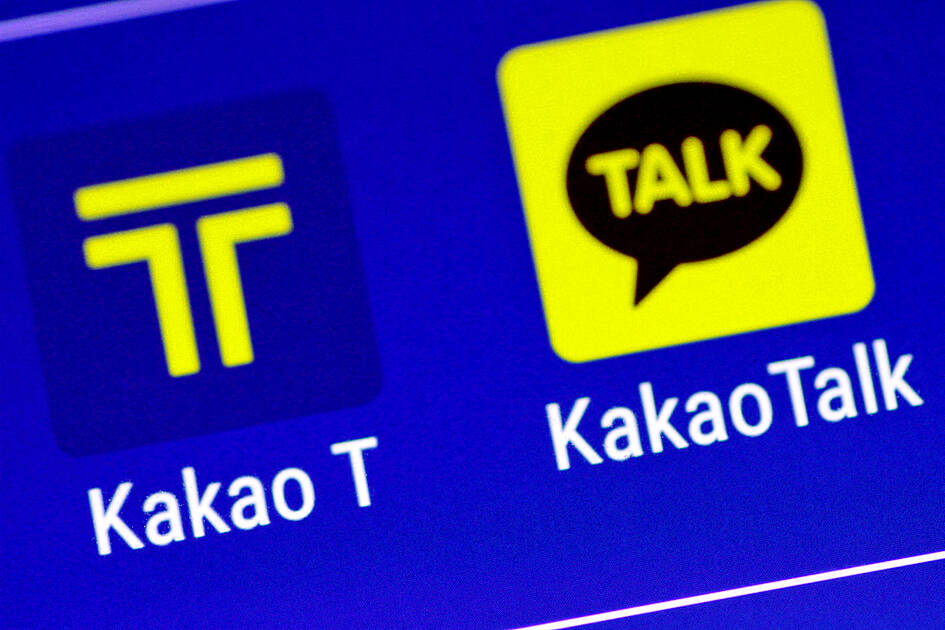Kakao Corp shares tumbled after a data center fire disrupted service at the Internet giant over the weekend, intensifying scrutiny of its outsized importance in Korean life.
The company’s stock dropped as much as 9.5 percent to the lowest since May 2020 before closing 5.9 percent lower. It was one of the biggest drags on the benchmark KOSPI yesterday, along with affiliates Kakaopay Corp and KakaoBank Corp.
The blaze halted messaging, payment, gaming and other popular services for hours on Saturday.

Photo: Reuters
Kakao said that as of yesterday morning, major services of KakaoTalk, South Korea’s No. 1 messaging app, had been mostly restored, while mail and map services remained limited.
KakaoBank said that all of its services had returned to normal.
The incident drew further criticism of the nation’s dependence on the group, which has met with public complaints and regulatory crackdowns over its market dominance after rapid growth. Kakao’s stock is nearly 60 percent lower this year, while KakaoBank has shed more than 70 percent and Kakaopay has plunged 80 percent.
“We will do our best to improve until the services are fully recovered,” Kakao said yesterday.
The firm expects the disruption to have a limited impact on its revenue, it said in a regulatory filing.
South Korean President Yoon Suk-yeol on Sunday ordered the government to support recovery of operations and called for an investigation into the cause of the incident.
“Although the network is run by a private company, it’s practically national communications infrastructure,” he said yesterday.
“If a monopoly or an oligopoly causes market distortions and acts like national infrastructure, I think the government should take action,” he said.
The presidential office said it would establish a cybersecurity task force led by Yoon’s national security director, as the incident was “a matter of national security.”
Lawmakers slammed Kakao for the lack of a contingency plan and said that they could roll out new regulations, including revising the existing broadcasting communications development law.
“It has solely engaged in reckless business expansion such as M&As and IPOs,” ruling People Power Party spokeswoman Yang Kumhee said, referring to initial public offerings by several Kakao units in the past few years.
“If the principal of self-regulation leads to a loss of such, there is no choice but to reconsider the government’s management and supervision methods,” she said.
Some analysts see a negative impact on Kakao’s fourth-quarter earnings as it might have to compensate for service disruptions and rivals gaining traction.
The incident is also seen worsening sentiment toward Kakao and its affiliates, which have high ownership among the nation’s day traders.
“The incident comes as public opinion is low on Kakao, as share prices have slumped since last year and some executives have sold shares at affiliates after going public,” NH Investment & Securities Co analyst Ahn Jae-min said. “We expect the short-term sentiment toward Kakao could be negative.”

CHIP RACE: Three years of overbroad export controls drove foreign competitors to pursue their own AI chips, and ‘cost US taxpayers billions of dollars,’ Nvidia said China has figured out the US strategy for allowing it to buy Nvidia Corp’s H200s and is rejecting the artificial intelligence (AI) chip in favor of domestically developed semiconductors, White House AI adviser David Sacks said, citing news reports. US President Donald Trump on Monday said that he would allow shipments of Nvidia’s H200 chips to China, part of an administration effort backed by Sacks to challenge Chinese tech champions such as Huawei Technologies Co (華為) by bringing US competition to their home market. On Friday, Sacks signaled that he was uncertain about whether that approach would work. “They’re rejecting our chips,” Sacks

Taiwan’s long-term economic competitiveness will hinge not only on national champions like Taiwan Semiconductor Manufacturing Co. (TSMC, 台積電) but also on the widespread adoption of artificial intelligence (AI) and other emerging technologies, a US-based scholar has said. At a lecture in Taipei on Tuesday, Jeffrey Ding, assistant professor of political science at the George Washington University and author of "Technology and the Rise of Great Powers," argued that historical experience shows that general-purpose technologies (GPTs) — such as electricity, computers and now AI — shape long-term economic advantages through their diffusion across the broader economy. "What really matters is not who pioneers

BUBBLE? Only a handful of companies are seeing rapid revenue growth and higher valuations, and it is not enough to call the AI trend a transformation, an analyst said Artificial intelligence (AI) is entering a more challenging phase next year as companies move beyond experimentation and begin demanding clear financial returns from a technology that has delivered big gains to only a small group of early adopters, PricewaterhouseCoopers (PwC) Taiwan said yesterday. Most organizations have been able to justify AI investments through cost recovery or modest efficiency gains, but few have achieved meaningful revenue growth or long-term competitive advantage, the consultancy said in its 2026 AI Business Predictions report. This growing performance gap is forcing executives to reconsider how AI is deployed across their organizations, it said. “Many companies

TAIWAN VALUE CHAIN: Foxtron is to fully own Luxgen following the transaction and it plans to launch a new electric model, the Foxtron Bria, in Taiwan next year Yulon Motor Co (裕隆汽車) yesterday said that its board of directors approved the disposal of its electric vehicle (EV) unit, Luxgen Motor Co (納智捷汽車), to Foxtron Vehicle Technologies Co (鴻華先進) for NT$787.6 million (US$24.98 million). Foxtron, a half-half joint venture between Yulon affiliate Hua-Chuang Automobile Information Technical Center Co (華創車電) and Hon Hai Precision Industry Co (鴻海精密), expects to wrap up the deal in the first quarter of next year. Foxtron would fully own Luxgen following the transaction, including five car distributing companies, outlets and all employees. The deal is subject to the approval of the Fair Trade Commission, Foxtron said. “Foxtron will be